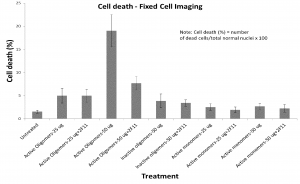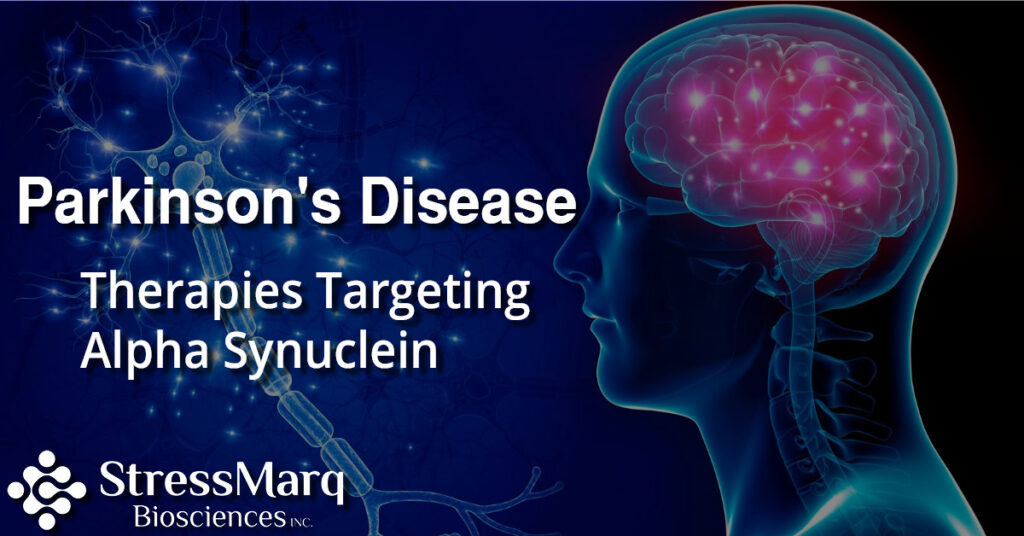Parkinson’s Disease Therapies Targeting Alpha Synuclein
Two important discoveries have led alpha synuclein to become a major therapeutic target for Parkinson’s disease. The first of these, a missense mutation (A53T) in the SNCA gene, has provided a clear genetic link to the condition1. The second, a high concentration of aggregated alpha synuclein in Lewy bodies and Lewy neurites (the classic pathological hallmarks of Parkinson’s disease), has been shown to play a central role in disease pathogenesis. Consequently, therapies aimed at modulating the expression or behavior of alpha synuclein hold significant promise.
What are different potential Parkinson’s disease therapies that target alpha synuclein and how do they work?
Many potential alpha synuclein therapies for Parkinson’s disease are currently undergoing evaluation in advanced animal studies or are already in clinical trials2. Included among these, methods designed to reduce alpha synuclein production are proposed to mitigate the risk of its aggregation. The use of RNA interference (RNAi) has already proven successful in decreasing the expression of endogenous alpha synuclein in rodents and squirrel monkeys3. More recently, alpha synuclein expression has been reduced by modulating SNCA gene transcription4.
Another approach to modify Parkinson’s disease involves inhibiting alpha synuclein aggregation. Various research groups have shown heat shock proteins to be effective in achieving this, on the basis that a key function of these essential molecular chaperones is to prevent protein aggregation. Others have focused on using intrabodies (small antibody fragments that are expressed intracellularly) to bind alpha synuclein monomers5. A collaboration between Neuropore Therapies and UCB has yielded an oral small molecule that is under assessment in clinical trials to determine its capacity for preventing the formation of alpha synuclein oligomers6.
It has also been shown possible to promote degradation of intracellular alpha synuclein aggregates, primarily by enhancing autophagy. Potential therapeutic agents tested in models of Parkinson’s disease include rapamycin, trehalose, and Nilotinib (a drug repurposed from oncology), with the latter proving able to cross the blood-brain barrier and enhance alpha synuclein clearance in a mouse model of synucleinopathy7. However, the possible side-effects of using such agents for long term treatment remain unclear2.
Strategies have additionally been devised to degrade extracellular alpha synuclein, using alpha synuclein antibodies as Parkinson’s disease immunotherapies. Prothena Biosciences has adopted a passive immunotherapy approach, whereby a humanized monoclonal antibody has demonstrated a reduction in free serum total alpha synuclein levels of up to 96.5%8. AFFiRiS is developing an active immunotherapy for Parkinson’s disease, using an alpha synuclein mimicking peptide as a vaccine to promote production of alpha synuclein antibodies9.
Supporting the study of alpha synuclein in Parkinson’s disease
Our product portfolio encompasses a comprehensive selection of high-quality reagents to support Parkinson’s disease research. These include various alpha synuclein proteins and antibodies, of which clone 2F11 is a potential therapeutic candidate. We offer alpha synuclein protein ibrils and oligomers that can be used to induce endogenous alpha synuclein phosphorylation and subsequent Lewy body inclusion formation in neuronal cell culture or for in vitro oligomerization studies.

Figure shows cell death of human SHSY-5Y cells in the presence of active α-synuclein oligomers, inactive α-synuclein oligomers, active α-synuclein monomers in the presence and absence of the 2F11 antibody. Cell death (%): Number of dead cells/Total normal nuclei x 100. Adding 2F11 antibody to the cells with active oligomers significantly reduced cell death.
REFERENCES
- Mutation in the alpha-synuclein gene identified in families with Parkinson’s disease, Polymeropoulos M.H. et al. Science. 1997 Jun 27;276(5321):2045-7.
- Therapeutic approaches to target alpha-synuclein pathology, Brundin P. et al. Exp Neurol . 2017 Dec;298(Pt B):225-235.
- Targeting Alpha-Synuclein as a Therapy for Parkinson’s Disease, Fields C.R. et al. Front Mol Neurosci. 2019 Dec 5;12:299.
- β2-Adrenoreceptor is a regulator of the α-synuclein gene driving risk of Parkinson’s disease, Mittal S. et al. Science. 2017 Sep 1;357(6354):891-898.
- Can intrabodies serve as neuroprotective therapies for Parkinson’s disease? Bhatt M. et al. J Parkinsons Dis. 2013;3(4):581-91.
- The small molecule alpha-synuclein misfolding inhibitor, NPT200-11, produces multiple benefits in an animal model of Parkinson’s disease, Price D.L. et al. Sci Rep. 2018 Nov 1;8(1):16165.
- Anti-Alpha-Synuclein Therapies in Parkinson’s Disease, Bahroo L.B et al. Practical Neurology. 2018 Sept.
- First-in-human assessment of PRX002, an anti-α-synuclein monoclonal antibody, in healthy volunteers, Schenk D.B. et al. Mov Disord. 2017 Feb;32(2):211-218.
- Emerging Immunotherapies for Parkinson Disease, Zella S.M.A et al. Neurol Ther. 2019 Jun;8(1):29-44.


Are there any human trials of drugs targeting alpha-synuclein? What is PRX002? I have a family member with worsening Parkinson’s. Thanks
Thank you for your question. Our company provides biological reagents for research scientists to study neurodegenerative diseases. We have no involvement with nor do we have information on clinical trials. Best wishes to you and your family.